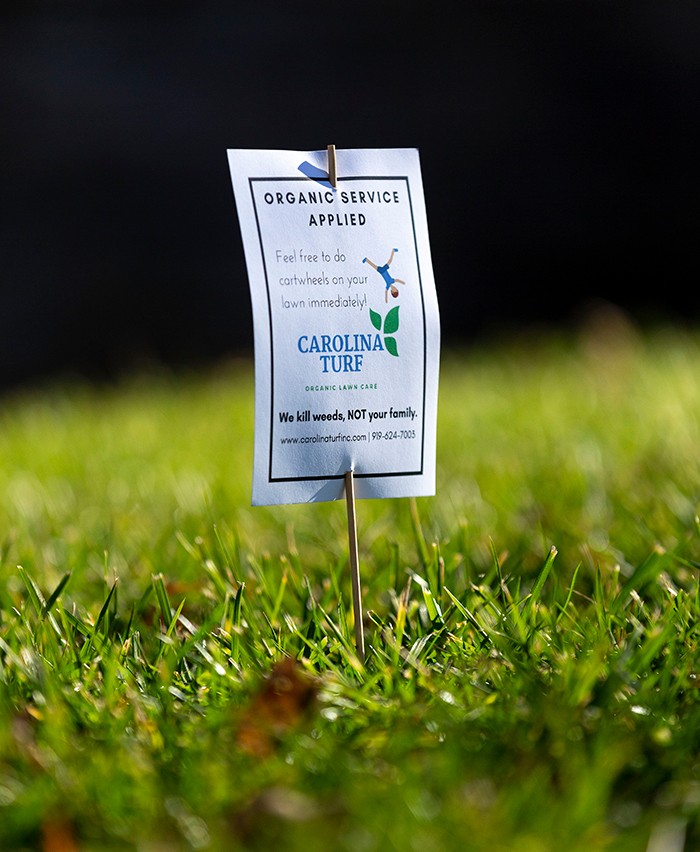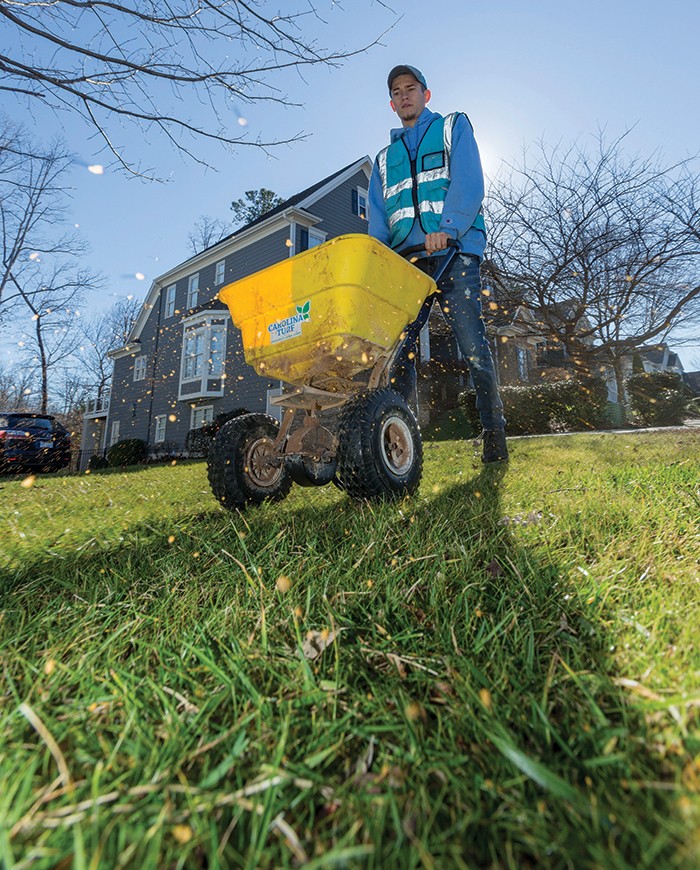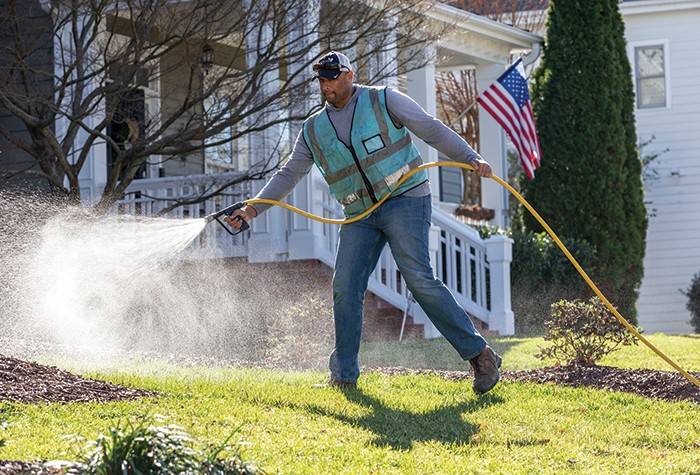It’s not your imagination. There are more than a hundred common weeds in the Triangle, and all of them grow better than your grass.

After treating a client’s lawn, Carolina Turf Inc. workers leave a notice saying, “Feel free to do cartwheels on your lawn immediately!” The company uses only biodegradable, natural products, so there’s no need to wait for herbicides or fertilizers to dry before walking on the grass.
The Triangle is in a transition zone, says Greg Harris, of Leap Frog Landcare in Fuquay-Varina. It’s cool enough to grow fescue and other cool-season grasses, but summers here are too hot for it to thrive. The warm-season grasses love the summer heat, but might go dormant and brown for seven or more months.
“That’s why it’s torture to grow grass here,” he said. “That is the reason why guys like me, businesses like mine, exist.”
Many local lawn rangers, who often must comply with HOA appearance rules, turn to professional lawn services to keep their yards at their best.
But concerns about chemical fertilizers, pesticides and herbicides have caused an increasing number of homeowners to look for more natural options. In particular, Roundup and its active ingredient, glyphosate, has been under scrutiny after several California juries last year awarded millions of dollars to plaintiffs who blamed exposure to the weedkiller for their cancer.
Organic approach
Cary-based Carolina Turf Inc. is rare, in that the lawn service doesn’t use any synthetic chemicals.
“Everything that we use is biodegradable. It degrades the weeds, turns them back to organic material, which is better for your lawn, and it’s greener, safer for kids and pets,” said owner Houston Hinson.
He experimented in his yard and at his father’s 11-acre property in Wake County to come up with his weed-control regimen. Carolina Turf uses a combination of substances including corn gluten meal, a pre-emergent weed retardant, and an herbicidal cocktail of vinegar, salt and soap.
“Even though we started using organic products just as an option in our business, years ago, I switched. I knew I didn’t want my newborn son crawling across our lawn with what I knew I sprayed on it,” said Hinson. “I knew if I felt this way, there had to be at least one or two other people who would feel this way about their kids, and their pets.”

Carolina Turf employee Kaelob Mann distributes corn gluten on a client’s lawn. Used as a pre-emergent herbicide, the natural substance prevents weed seeds from forming roots and gives grass a nitrogen boost.
Hinson’s company has offered only organic lawn care for the last five years, and every year, he says more people call to ask about his services. Along with individual clients, Carolina Turf also tends a number of commercial properties that market themselves as green communities.
While Heather Lloyd, owner of Edge Aveda Hair Salon in Chapel Hill’s Veranda, and the other shopping center tenants wished for well-maintained grounds, that was not top of mind when they hired Hinson’s company.
“Some of the tenants had expressed concern with spraying traditional chemicals near the restaurants in the community,” she said. “It was really more of a health issue, more than anything else, and that was our primary concern.”
Data, not hype
Dr. Fred Yelverton, professor and extension specialist at N.C. State University, agrees that it’s best to use as few chemicals as needed on one’s lawn, and he is confident of their safety when used as directed.
“I’m a scientist, so I have to go by what the science is,” he said. “Until there’s solid science that says it’s a problem, I am going to stick with the vast, vast number of studies — including EPA — that say it’s not a problem.”
N.C. State Extension has plenty of resources for folks who want a more natural lawn care regimen. But Yelverton, who has worked on weed management in turfgrass and forage crops for 36 years, says those property owners may have to put up with a few more weeds.
“If people want to do that on their property, that’s certainly something that we can help them with,” he said. “But the first thing I would mention to them is, if you want to take out fertilizers and pesticides, you need to reduce your expectations of what the lawn will look like.”

Houston Hinson, owner of Carolina Turf, has offered organic services for over five years. He says more people have been seeking his services in the last several years, as they become more uncomfortable with synthetic fertilizers, herbicides and pesticides.
Hybrid lawn care
While Leap Frog once offered an all-organic maintenance service, that option was discontinued in favor of a hybrid program – using synthetic herbicides – because of customer complaints.
- Mow grass at the proper height. Fescue should be left at 3-4 inches, so set your mower at the highest it will go. Warm-season grass like Bermuda or zoysia should be mown shorter, at 2 1/2 inches.
- Make sure your mower has a sharp blade.
- Mow regularly. Don’t remove more than one-third of the grass height at one time. If you go on vacation, arrange for someone to cut your grass while you’re gone.
- Plant the right grass in the right place.
- Pulling weeds by hand, before they form seed heads, is the safest and most effective weed-control method.
- Flame weeding machines can burn individual weeds.
- A cocktail of white vinegar, table salt and liquid dish soap is a natural herbicide — just don’t spray it near your grass. Mix 1-gallon vinegar, 1 cup salt and 1 tablespoon dish soap in a spray bottle, and, for best results, treat weeds at the sunniest time of day.
“Organic Lawn Care: A guide to organic lawn care and pest management,” written in 1997 by Fred Yelverton, A.H. Bruneau, L.T. Lucas and Rick L. Brandenburg, is available at https://content.ces.ncsu.edu/.
Harris, who has owned the business for nine years, tells of a client who paid extra to get organic weed control in the landscape beds. But after a number of weeks, the client was unhappy and complaining about shoddy service. The employee caring for the customer’s lawn was frustrated as well.
“He’s like, ‘I do this every week, and the stuff doesn’t work,’” Harris said. “They’re requiring us to use it. They’re paying for it, it’s not working, and it’s causing tension between the customer and us, and with the employee and us.”
Harris says organic herbicides can work for individual homeowners who have time to test a variety of products in their yard and who can spray weeds weekly, but he hasn’t found the products to be practical for his business.
“With grass, organic fertilizers are fabulous; organic soil amendments are fabulous. Organic selective weed control — and what I mean by selective is it’ll kill the weed without killing the grass — is virtually impossible around here,” he said.
Lawn Doctor in Apex also offers a hybrid service – using natural fertilizers and soil amendments, but still controlling weeds with synthetic products.
“I understand some residents want alternatives, especially with all the negativity in the media. We are just as concerned with people’s health and the environment,” said owner Victor Britt. “As long as the products are used as recommended, there is very little risk.”
Healthy grass, few weeds
Both Yelverton and Harris agree that the best way to prevent weeds from infiltrating your lawn is to keep your grass at peak health. To do that it’s vital to mow grass at the proper height, use a sharp lawnmower blade, water in the right amounts, fertilize at the right rate and be consistent about maintenance.
It’s also important to have the right kind of grass and landscaping for the property, Harris says. Some yards will never grow a lush lawn, no matter what kind of treatment you use. He tells of one community where the residents were caught in a horticulture Catch-22 because of HOA rules.
“They’ve got warm season grasses which require a lot of light, a lot of sun, and they’ve been required to plant trees that get really big — for example oak trees — in their front yard, that pretty much shade out the grass. Then they get in trouble because the grass isn’t doing well,” he said.
“Sometimes just where we want grass, doesn’t mean that’s the right place for it.”
- Act Naturally
- Act Naturally
- Mr. Cary Spirit
- The Not-So-Secret Sarah P. Duke Garden
- Nonprofit Spotlight: White Oak Foundation
- Best of Both Worlds
- Small Business Spotlight: The Flower Cupboard
- From the Editor: March 2020
- Alex & Teresa’s Pizzeria & Trattoria
- Worth the Drive: A Fresh Look at Calabash Seafood
- Liquid Assets: Spring Bock by Carolina Brewing Company
- Liquid Assets: Raymond Fairchild Root Beer White Lightning
- Garden Adventurer: Scadoxus, for the Gambling Gardener





